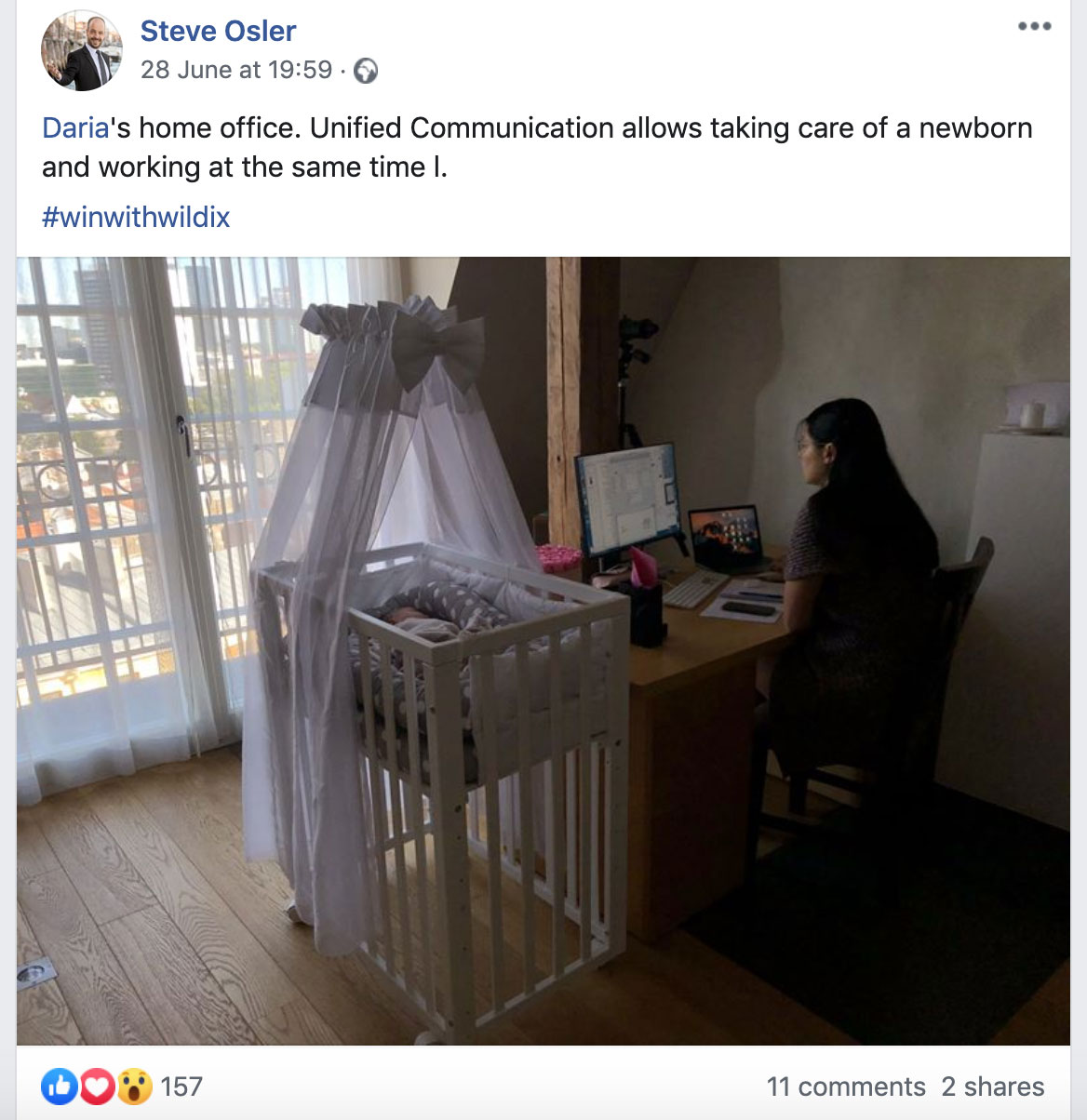
The age of first pregnancy has been on the rise for many years. Today, according to Eurostat, European women give birth to their first child at the age of 30.7, four years older than 30 years ago.
The main factor behind this change is that women want to progress in their careers before starting maternity.
While technology today allows women to take on these two roles, archaic ideas deeply rooted in collective thinking continue to lead women to believe that they must choose between career and motherhood.
Tallinn, Odessa, Trento, Lille, we went to meet the men and women who make up Wildix’s heart. They tell us how, thanks to unified communications technology, they are living their parenting and career to the fullest, shattering prejudices.
For this first part of our “Parenting with Tech” Saga, we interviewed Daria Koval, Purchasing Manager and mother of Olivia who, at the time of the interview, was 2 months old.

Responsible for inventory, suppliers and product quality worldwide, Daria Koval holds a strategic position in the company. Responsibilities that led her to make frequent trips to China to keep an eye on the production chain, supervise quality but also to monitor technological developments in order to acquire new products. Travels that pushed her to delay the start of a personal project: her baby.
Arriving in the company at the age of 20 and after 13 years dedicated to her career and her evolution within the Telecom challenger Wildix, Daria realizes that it is time to have a baby and no longer postpone this project: “The most important thing was that I didn’t have to choose between pursuing my career and having a baby. I knew that, no matter what, the company would support me. So I knew I could be a mother but also Purchase Manager. I just had to be ready for this new adventure and above all to organize myself well because it was out of the question to make concessions, neither on my career nor on my role as a mother.”
A productive pregnancy
It is a general idea to believe that, in all cases, the pregnancy and the first months of the baby are complicated and have a negative impact on the employee’s productivity. Daria shares: “I worked for 8 months from the Tallinn office, fortunately, I didn’t have any problems during my pregnancy. I was able to go to the office every day. I travelled to China and Barcelona for work. Only the last month requested adjustments. My tired body required more frequent pauses and changes of position, as well as more comfortable supports. So, I only started working from home in the ninth month. It was easier physically. I could find a comfortable position and use my stomach to put the computer down and work from the chair. It helped me a lot.”
A hassle-free delivery, a gradual and rapid return to work.
Daria explains that she gave birth on Sunday and had worked the day before from home. “4 days after the birth, when I got home, I opened my computer and started answering the first emails. The rest of the week, I already spent 2 to 3 hours a day at work. Two months, then I manage 100% of my job.”
Mothering and working: an option?
While in many countries women can take maternity leave ranging from 12 to 52 weeks, our interviewees are unanimous. Looking after a new-born child is magical and at the same time, if it is the only activity we do, it is very quickly boring, repetitive and long.
Daria Kova explains: “It is important to know that caring for a healthy baby is limited to feeding, burping and changing it. A newborn baby sleeps between 16 to 20 hours a day, so most of the time she sleeps. This is a contrast that an active woman may have difficulty with. I am lucky that my company is provided with the tools which have allowed me to keep myself busy working from home, but above all not to feel excluded. The UCC system allows me to stay in touch with hundreds of employees of my company and my service providers. I can thus put my free time as a young mother to the benefit of society and of what I have built during my career through the years.”
Daria tells us: “The breastfeeding moment is, to my great surprise, a quiet moment when I can make my calls. Olivia doesn’t cry and I have a free hand.”
While the mothers cherish her first moments, they all confide in us without exception that the first few weeks, boredom can quickly set in if their days are limited to taking care of the baby. Interactions with a baby are limited. So, having the chance to gradually return to work becomes a need.
The rhythm is cyclical and certainly jerky due to the child’s nap, but Daria, like Nathalie (whom you will discover in our next issue), has regained 100% of their activity after 2 weeks of adjustment and by modifying their time amplitudes.
Daria Koval explains: “I breastfeed my child every 2 to 3 hours but then she sleeps for 2 to 3 hours. So, I can dedicate this time to work, and thus take calls, answer my emails, make conference calls. I don’t have a predefined program and the company is flexible on schedules. So, I can manage my time and take a call from Asia at 8 pm, answer an email at 6 am and not be available at noon because I am breastfeeding. The finality is that the work is done, that my productivity is 100% managed simply at a pace adapted to the child. Everyone is happy, my child is healthy and has the attention of his mother, and at the same time, the company is not affected. Wouldn’t it have been more impacted by the cost and training time of a maternity replacement? Thanks to technology, being able to take on these two roles has made me feel happy and complete. I am productive in both fields. At work, I can manage my team, supervise its work. But I am also productive at home and can see my daughter’s first smiles and movements. She started taking my hand, making sounds. I know that some women have to use babysitters, day-care centres or their families to take care of their children. I don’t have that choice to make. I do not need to delegate my child’s learning and needs to a third party. I don’t feel any frustration.”
“It’s a chance. I can take care of my child and my career does not suffer from my maternity and vice versa. I am a mother and a Purchasing Manager.”
Daria’s advice to companies:
“My advice would be for companies to provide the tools and enjoy the benefits of Unified Communications, which would limit women’s apprehension of having both a career and a child. Because in the end, a woman who is given the opportunity to have both will do what is necessary to be happy and give the best of herself and to contribute to the success of the company that gives her the means to raise her child. It is a virtuous circle for the company and the employee. The future is already here, and companies should seize this opportunity.”
25% of Wildix’s salary staff are women under 30 years of age. 80% of these women do not yet have children.
Steve OSLER, CEO of Wildix, comments on the subject:
“People like to work and mothers are no exception. Forcing a new mother to give up all her social interactions at work on the pretext that she is pregnant is sexist and archaic. The final decision about when to have a baby and how to lead a life after the newborn should not be dictated by the company she works for or by society. Of course, this is not possible for all workplaces, but should not be a problem for office work. The possibility of working from home, with their children, is perfectly permitted by modern technology and must be fully used to achieve a better balance between personal and professional life. Wildix represents women’s freedom to decide if and when to have a baby, without negatively impacting their careers.”